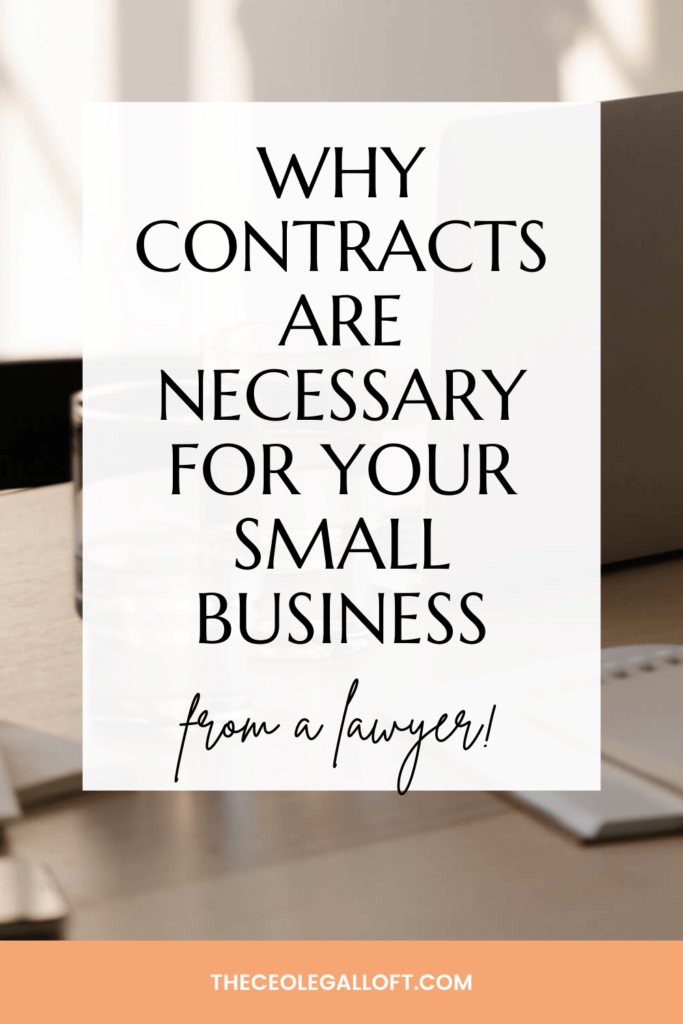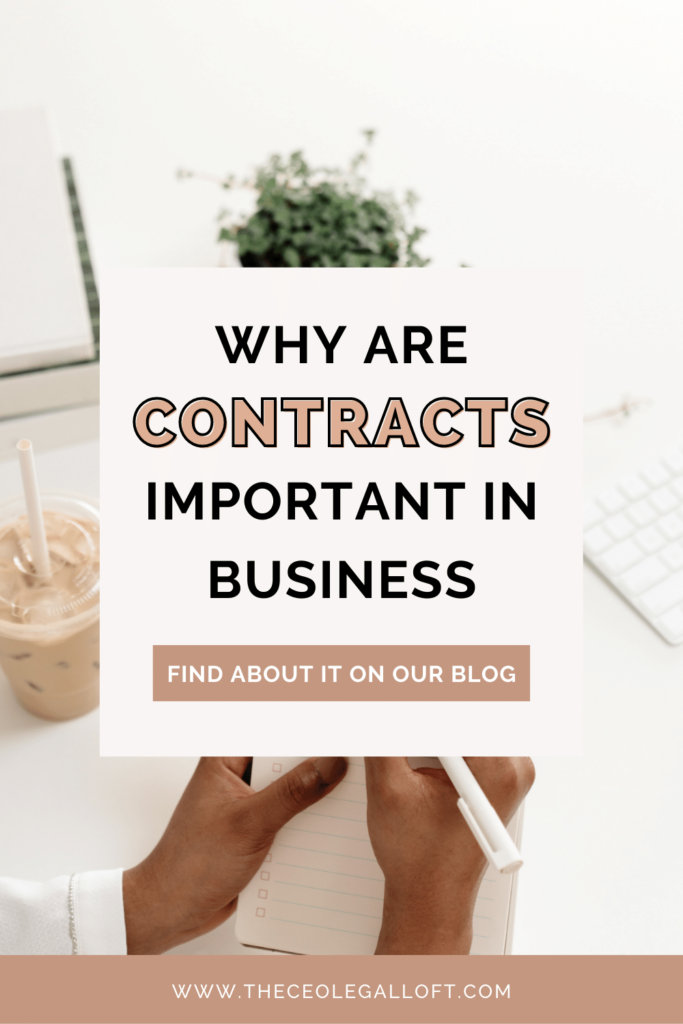Having a contract is important for your business because it sets up the relationship between you and your client. It is a legal document that demonstrates each party’s responsibilities, expectations and rights. Contracts are legally binding documents that can provide protection for all parties involved when disputes arise.
Without having a contract, your relationship with your client is based on verbal agreements and trust and that’s really difficult to enforce in court.
Though there are many reasons to use contracts in business, here are 9 reasons to have a contract in place.
What is a contract and why are contracts important?
Contracts are formal agreements between two or more parties. They are important because they establish the terms of a relationship, and useful in resolving disputes. Contracts can be written or oral (although harder to enforce), and are usually enforceable by law.

A contract minimizes misunderstandings
One reason a contract is important for your business is because it minimizes misunderstandings. Contracts are an opportunity for you and the other party to discuss your expectations in detail and come to an agreement about them. This can help prevent confusion or frustration later on in the relationship.
For example, a contract could specify which party is responsible for a project’s design and layout, who will handle the printing process, whether revisions are included in the scope of work and when payment is due. It’s better to talk about these things ahead of time than to have disagreements down the line over questions that could have been avoided with a clear contract.
Establish payment deadlines and method
Having a contract in place can help set expectations and avoid any misunderstandings about payment terms between you and your client. When writing your contract, include a section on payment that includes details like when payment is due and how you will get paid (Paypal, credit card, etc.).
They also outline consequences of late payment or non-payment, as well as policies for returns or refunds.
Clarify what work all parties are responsible for
Having a contract clarifies the responsibilities of all parties, making it more likely that everyone will act in good faith and be happy with the end result. Your goal when creating a contract is to clearly state what each party is responsible for doing, and how performance will be measured against those goals. If someone doesn’t hold up their end of the contract, the document provides clear guidelines on what should happen next.
That clarity means that you’re less likely to have any problems while working with you.

A contract builds confidence with your client or customer
A contract builds confidence with your client or customer. Contracts are an important part of doing business because they remove uncertainty and provide a clear outline of the relationship.
You can’t read someone’s mind to know what they’re thinking, so having it spelled out clearly helps everyone get on the same page right away. It also shows that you mean business and are a professional, not just a hobbyist.
Certain products or services must be agreed to in writing
Some business transactions must be in writing to be enforceable, such as those for goods over a certain amount of money.
These are usually contracts involving real estate and those that last longer than a year. Also, some states require that certain contracts be in writing to be legally enforceable.
With larger transactions, your attorney might also want you to create a contract. If it’s not legally required that you draw up a written contract, it’s still smart to write up a contract. Whether or not you think you’ll need it later, having it now can ensure that both parties understand their responsibilities and can save time resolving disputes later on down the road.
A contract helps prevent disputes that lead to lawsuits
In many situations, a contract can help prevent disputes that might lead to lawsuits. For example, you can add a mediation or arbitration clause to try to work out any issues, instead of taking things to court immediately.
The contract should also include an exit strategy for when things go wrong. If there’s a well written termination clause, you can end the contract without having to file a lawsuit.

A good contract provides you with certain protections as a business owner
You should always have your customers sign a contract before you begin work. This provides you with certain protections as a business owner, such as:
- Specifying exactly what work needs to be done by when. If you don’t meet those deadlines, you could be in breach of contract, which can lead to legal action against you.
- It protects your intellectual property (IP) such as copyrights, trademarks, and any patents in your business. A nondisclosure agreement (NDA) prevents customers or employees from sharing your proprietary information with others.
Having a well-written contract is good for your image, your brand, and professionalism
Having a contract shows professionalism and respect. When you have a contract, it shows that you take your business seriously. It shows that you’re not just some random person who is trying to make money as a side gig.
You’re not just someone doing something for free to fill up your free time. Instead, you’re a professional — someone who has dedicated themselves to their craft.
Having a contract is an important way of communicating this message. In many cases, it will be the first thing your client sees when they start working with you. It communicates the fact that you take what you do seriously and that they should take you seriously too.
A contract saves you money in the long run
When you have a contract, you may be able to avoid going to court. When you say, “Oh, I don’t need a contract, because if there’s ever an issue with it, I can take them to court,” that’s true — you can. But who wants to?
Who wants to rack up court costs, and most importantly, time that you’ll be spending that you’ll never get back.
If you have a good contract, it’s black and white. It will give the parties their rights and remedies and the person who has breached the contract will know exactly what it is they did wrong. You won’t get into arguments about whether or not they did this or that.
When people are on their best behavior, they like to think that everything can be done with a handshake. But as human nature would have it, things go wrong all the time. So better to have that contract in place before problems arise so everyone knows where they stand.

Takeaway: It’s so important to have a contract because it will help your business run smoother.
Having a contract is an instruction guide for the work that you’re doing for a client. It instructs both parties on how to conduct themselves and what happens if things go wrong.
Your contract clearly defines the terms of your agreement, as well as your expectations and goals. Each party to the contract understands their responsibilities and how they will be compensated, and there are no misunderstandings or conflicts down the road.
Having a contract also gives you documentation of the agreement, which can be helpful if you end up suing one another or in any type of legal matters. A contract also helps define how you will work together in the future, so you can create more contracts down the line with this same partner if things go well initially. The list goes on and on for why it’s so important to have a contract.
If you don’t have a contract, and would like one that’s already drafted for you by an attorney, check out The CEO Legal Loft Template Shop. There are contract templates that are necessary for your website, your services, and building out your business.
Need multiple contracts for your business? Inside The Contracts Pass, you’ll get 21 contract templates that you can use for contractors, new offers, events, and more.

+ show Comments
- Hide Comments
add a comment